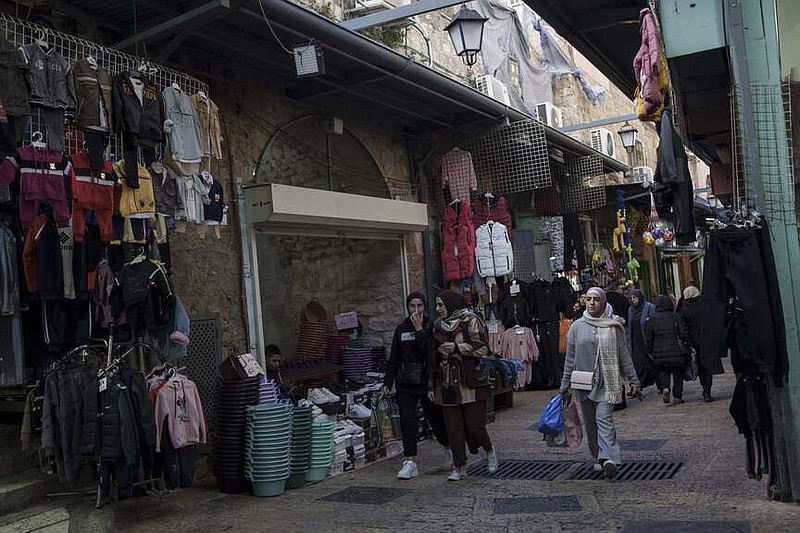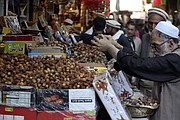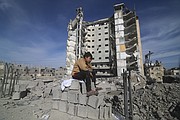JERUSALEM -- On the eve of the Muslim fasting month of Ramadan, Jerusalem's Old City bears few of its usual hallmarks of festivity.
Nearly half of the grotto-shaped gift shops are sealed behind metal shutters. The narrow streets that run toward Al-Aqsa Mosque, Islam's third-holiest site, are eerily empty. Absent are the fairy lights and shining lanterns that would usually dangle above hurried worshippers.
Ramadan preparations in Jerusalem, the spiritual heart of the decades-old Israeli-Palestinian conflict, have been subdued because of the Israel-Hamas war in Gaza, now in its sixth month. With more than 30,000 Palestinians killed in Gaza and hundreds of thousands going hungry, there's little room for expressions of joy.
"This will be the black Ramadan," Abu Mousam Haddad said in front of his coffee stand near Damascus Gate, one of the Old City's main entrances.
But over the next few days, attention is likely to shift from Gaza to Al-Aqsa, which has been a frequent flashpoint for quickly escalating Israeli-Palestinian violence in the past.
Hamas, which portrayed its Oct. 7 attack on southern Israel as a battle for Muslim rights at Al-Aqsa, seeks such an event now in the hopes of engaging Israeli forces on new fronts and improving its leverage in Gaza cease-fire talks.
The militants have urged Palestinians across Israel and the occupied West Bank to stream to the mosque during Ramadan to challenge anticipated Israeli restrictions on worship and movement.
Although such restrictions often triggered past clashes, it's not clear if Palestinians will risk confrontations in the current climate in which Israeli forces are clamping down hard on any perceived threats.
"There is great fear among people about what Ramadan will look like this year and how the Israeli police will behave regarding the entry and exit ... into the city," said Imad Mona, who owns a bookshop outside the Old City.
Israel has limited access to Al-Aqsa to varying degrees over the years, including by barring young men, citing security concerns. The Israeli government has provided few details ahead of this year's Ramadan, which could start as early as this evening, but it has said some Palestinians from the West Bank will be allowed to pray at Al-Aqsa.
In the past, Israeli forces raiding the sacred compound have clashed with stone-throwing Palestinians who barricaded themselves inside, at times to protest Israeli access restrictions. Such clashes have triggered escalations, including Hamas rocket fire, which set off a brief Israel-Hamas war in 2021.
The compound has long been a deeply contested religious space because it stands on the Temple Mount, which Jews consider their most sacred site. It lies in east Jerusalem, a section of the city Israel occupied during the 1967 Mideast war and later annexed. Palestinians want to make it the capital of their own future state.
The United States and other international mediators had pushed for a Gaza cease-fire to coincide with the start of Ramadan, but there has been no breakthrough.
Israel remains committed to continuing its invasion and annihilating Hamas, which killed about 1,200 people in Israel and took about 250 hostages on Oct. 7. The militant group freed dozens of hostages during a November truce, but it refuses to release more without guarantees of a complete end of hostilities.
Most Old City shop owners declined to share their views about the coming Ramadan. Scores of Palestinians have been detained by Israel over social media posts about the war in Gaza since it started.
Some who would speak said more Israeli police have been deployed in the Old City since October. Young Palestinian men are regularly barred from entering the Al-Aqsa compound for noon prayers on Fridays since the war started, according to the store owners. This has fueled speculation about other possible restrictions. The Israeli police did not respond to requests for comment.
According to Israeli media, the country's firebrand national security minister, Itamar Ben Gvir, has been pushing to keep out all West Bank Palestinians, as well as young men who are among the more than 2 million Palestinian citizens of Israel. His spokesperson did not respond to a request for comment.
The Israeli military body in charge of Palestinian affairs in the West Bank, known as COGAT, said Friday that some Muslims from the West Bank would be allowed in from the territory for Ramadan prayers, but it didn't elaborate. Last year, hundreds of thousands were able to enter, most of them women, children and elderly men.
Prime Minister Benjamin Netanyahu has also been vague, saying only that similar numbers of people as last year would be allowed in for prayers at Al-Aqsa during the first week of Ramadan. He said this will be evaluated on a weekly basis throughout the month. No further details were made public.
Under an informal arrangement since 1967, the compound is administered by a Jordan-based Muslim religious body known as the Waqf. Jews are allowed to visit the compound, but not to pray there. The agreement has broken down in recent years as large groups of Jews, including hard-line religious nationalists, have regularly visited. Some among them have attempted to pray at the site.
In the days leading up to Ramadan, West Bank Palestinians have been unsure whether they would be able to attend prayers.
In general, Palestinians in the territory need a permit to enter east Jerusalem, which Israel considers part of its united capital, though its annexation is not recognized by most of the international community. Since Oct. 7, Israel has forbidden Palestinians from entering Jerusalem or any part of Israel.
The holy month also threatens to heighten divisions within Israel's unruly cabinet, with ministers already split over how to conduct the Gaza war.
In a post on X, formerly Twitter, Ben Gvir denounced Netanyahu's decision to allow Palestinians access to Al-Aqsa for Ramadan prayers. He wrote that "Hamas celebrations on the Temple Mount" do not equate to "a complete victory," a reference to Netanyahu's wartime battle cry.
Ben Gvir, who has visited the Al-Aqsa compound several times, is also a vocal opponent of any cease-fire arrangement with Hamas. He has repeatedly called for the removal of Palestinians from Gaza and the establishment of Israeli settlements -- ideas that most Cabinet members oppose.
Months of conflict and tension have also brought economic hardship, with a lack of tourists and Palestinians shopping in the Old City.
"It's not just my shop that is affected, but all the traders here, too," said Jihad Abu Salih, a sweets and pastry merchant from the city. "It's sad."
VISIT TO BEIRUT
A top U.S. Treasury official visiting Beirut last week pressed Lebanese authorities to prevent funds from being funneled to Hamas by way of Lebanon, officials said.
Jesse Baker, deputy assistant secretary of the Treasury for Asia and the Middle East in the Office of Terrorist Financing and Financial Crimes, met with Lebanese politicians and officials from the financial sector Thursday and Friday.
Should the war continue during Ramadan, many fear a regional escalation, including in Lebanon. Near-daily low-level clashes have taken place between the Lebanese militant group Hezbollah, a Hamas ally, and Israeli forces for more than five months.
A Treasury official who spoke on condition of anonymity to discuss sensitive matters said Baker had shared with Lebanese authorities "specific concerns" about "the movement of Hamas funds through Lebanon, Hezbollah funds from Iran into Lebanon and then out into other regional areas" and called for "proactive measures" to combat it.
The official said the groups need the flow of funds to pay their fighters and conduct military operations and cannot achieve their aims otherwise.
The Treasury official added that for Lebanon, showing compliance with global anti-money-laundering and counterterrorism financing standards is key to attracting investment from the United States and the rest of the world and to pulling the country out of its protracted crisis.
Baker pushed for Lebanon to crack down on the large sector of illicit financial service companies that have flourished amid the collapse of the country's formal banking system over four years of economic crisis, including illegal money exchange and unlicensed money-transfer operations, the Treasury official said.
Those businesses -- along with a cash economy that the World Bank has estimated amounts to nearly 46% of Lebanon's GDP -- have offered workarounds for people and groups barred from the formal financial system by U.S. sanctions, including Hamas and Hezbollah, both of which Washington considers terrorist organizations.
Walid Kilani, a spokesperson for Hamas in Lebanon, said he had "no information" about the matter.
Halim Berti, spokesperson for Lebanon's central bank, confirmed that officials with the institution had met with Baker and described the meetings as "very positive."
He said the central bank is doing its part to regulate licensed financial-service businesses but that those operating without a license are "not in our jurisdiction" and should be dealt with by law enforcement.
Information for this article was contributed by Jack Jeffery, Abby Sewell and Mahmoud Illean of The Associated Press.
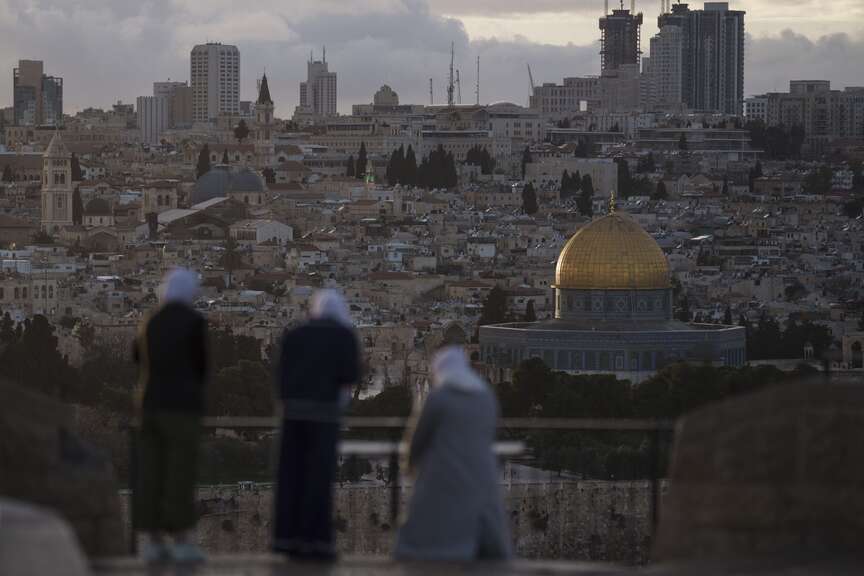 FILE - Muslim women visit the Mount of Olives, overlooking the Dome of the Rock at the Al Aqsa Mosque compound in the Old City of Jerusalem, Thursday, March 7, 2024. Restrictions put in place amid the Israel-Hamas war have left many Palestinians concerned they might not be able to pray at the mosque, which is revered by Muslims. (AP Photo/Leo Correa, File)
FILE - Muslim women visit the Mount of Olives, overlooking the Dome of the Rock at the Al Aqsa Mosque compound in the Old City of Jerusalem, Thursday, March 7, 2024. Restrictions put in place amid the Israel-Hamas war have left many Palestinians concerned they might not be able to pray at the mosque, which is revered by Muslims. (AP Photo/Leo Correa, File)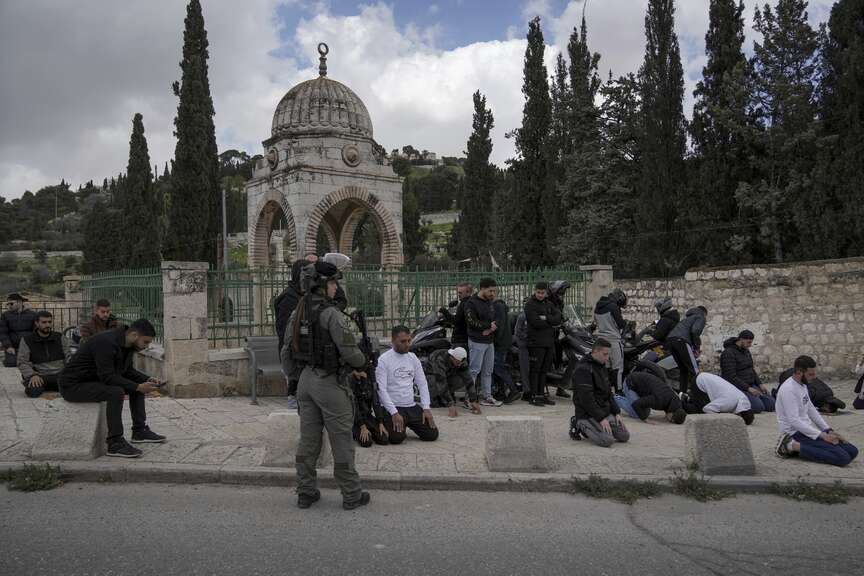 Palestinian Muslim worshipers who were prevented from entering the Al-Aqsa Mosque compound, pray outside Jerusalem's Old City, Friday, March 8, 2024. Restrictions put in place amid the Israel-Hamas war have left many Palestinians concerned they might not be able to pray at the mosque, which is revered by Muslims. (AP Photo/Mahmoud Illean)
Palestinian Muslim worshipers who were prevented from entering the Al-Aqsa Mosque compound, pray outside Jerusalem's Old City, Friday, March 8, 2024. Restrictions put in place amid the Israel-Hamas war have left many Palestinians concerned they might not be able to pray at the mosque, which is revered by Muslims. (AP Photo/Mahmoud Illean)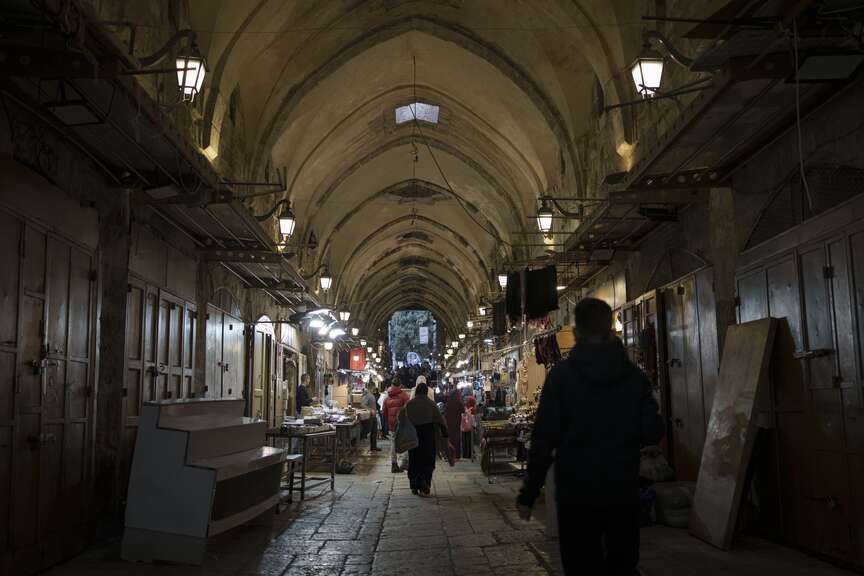 File - Palestinians walk through a market ahead of the holy Islamic month of Ramadan in the Old City of Jerusalem, Thursday, March 7, 2024. Restrictions put in place amid the Israel-Hamas war have left many Palestinians concerned they might not be able to pray at Al-Aqsa Mosque compound, which is revered by Muslims. (AP Photo/Leo Correa, File)
File - Palestinians walk through a market ahead of the holy Islamic month of Ramadan in the Old City of Jerusalem, Thursday, March 7, 2024. Restrictions put in place amid the Israel-Hamas war have left many Palestinians concerned they might not be able to pray at Al-Aqsa Mosque compound, which is revered by Muslims. (AP Photo/Leo Correa, File)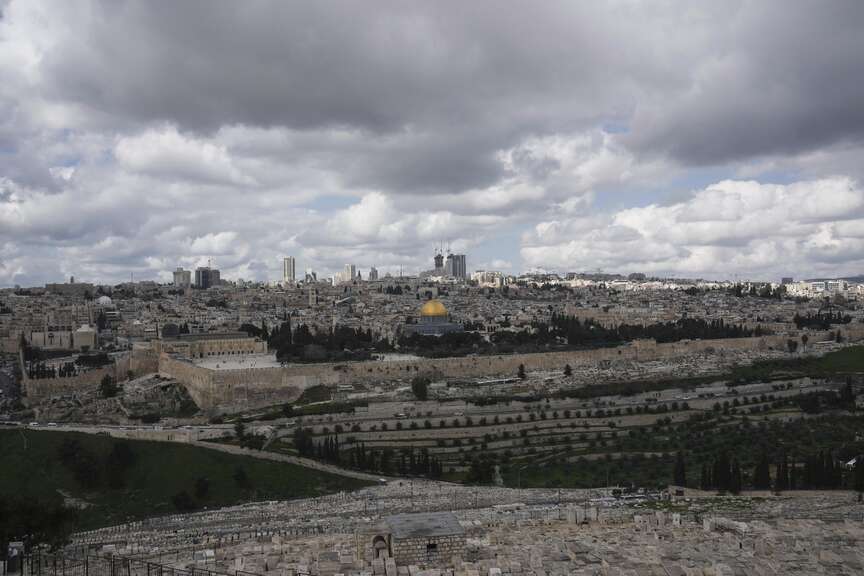 A view of Jerusalem's Old City with the Dome of the Rock in the Al-Aqsa Mosque compound, Friday, March 8, 2024. Restrictions put in place amid the Israel-Hamas war have left many Palestinians concerned they might not be able to pray at the mosque, which is revered by Muslims. (AP Photo/Mahmoud Illean)
A view of Jerusalem's Old City with the Dome of the Rock in the Al-Aqsa Mosque compound, Friday, March 8, 2024. Restrictions put in place amid the Israel-Hamas war have left many Palestinians concerned they might not be able to pray at the mosque, which is revered by Muslims. (AP Photo/Mahmoud Illean)